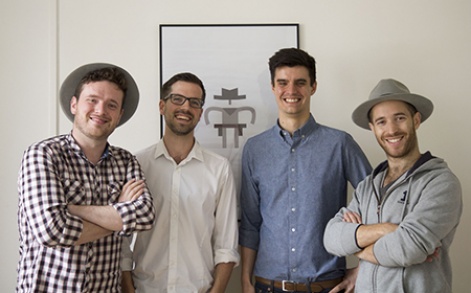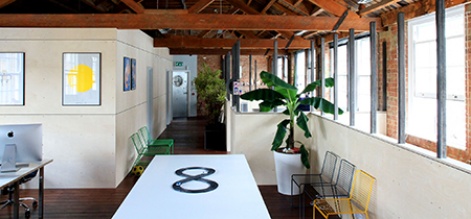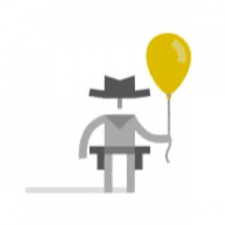How did you get into game development?
Perhaps you woke up one morning with an idea so good that it couldn't be ignored.
Maybe you've been a gamer for as long as you can remember, and couldn't wait to contribute your own creations to the art form.
Or, if you're like the team over at indie developer Cowboy Games, you probably just wanted to tell a really elaborate joke.
You see, for Ed Barrett and Tom Judd - the founding members of Cowboy Games - designing, creating, and ultimately selling a game was only initially meant to be an entertaining side project.
The duo's real work was being done at at London-based animation studio, Animade, where they collaborated with a talented team intent on pushing the boundaries of animation and interactive design.
Founded by Tom and his business partner James, Animade was created as a way to pursue one passion while giving the Cowboy Games the lifeline it needed to stay afload.
Without Animade, Cowboy Games couldn't exist, but as Animade began to develop and grow the lines between animation, interaction, and gaming were becoming blurred.
Initially we approached game development as something as a joke.Ed Barrett
Eventually, with the firm continuing to leap from strength to strength, new faces were brought in, giving Ed and Tom more time to plunge back into the uncharted waters of game development.
It was a win-win situation, a perfect status quo, and it was at this point that the pair realised they might've unearthed that rarest of gems: an idea that had the potential to go the distance.
Why so serious?
"Initially we approached game development as something as a joke. It wasn’t serious at all," explains Ed.
"We were going to try and dress our game up as this hugely fanciful project, full of animation and design, but then, when you get to the gameplay there’d be hardly anything there, and you’d realise it’s a joke.
"Very quickly though, we realised that this nothing mechanic, of what was essentially a reaction game, was fun to play, so then we started to knuckle down at take the whole thing quite seriously."
The Cowboy Games team let their love of animation shape their first project, Ready Steady Bang: a title that gave birth to the Cowboy.
"We wanted the game to have stripped back mechanics, and stripped back visuals. We aimed to use our love of design and animation to construct a game that we could create using - at the time - our limited knowledge. The result of that process was Ready Steady Bang," reveals Ed.
"To keep the Cowboy alive we went into animation production, and pushed those products.
"We knew how much we loved the character, but we were also trying to become successful animators, and that took up a lot of our time.
We realised it was important our gaming became a cross between animation and interaction.Ed Barrett
"At that time, the only thing we could do for the Cowboy was to throw up the odd promo video to boost the sale of Ready Steady Bang.
"However, as time progressed, and Animade as a company got a little larger, we were able to bring in people to do things. After that we suddenly realised it was important that our gaming became a cross between animation and interaction."
Guy love
Making the choice to dedicate more time to game design was a no-brainer, but the team still had to overcome their lack of development experience.
It was at this point, in Cowboy Games' self-professed hour of need, that Guy Kogus, a software engineer with a penchant for iOS development, appeared to answer the teams' prayers.
"Being a company that services both interactive entertainment and animation, it seemed crazy not to pursue game design," says Ed.
"That’s when Guy appeared, out of the beautiful thin air, like a shining knight. Guy helped us create a game that was a lot fuller, and do this Cowboy character that we love so much a lot more justice."

Guy's addition meant the team had finally found their missing puzzle piece, and having a person on board who knew their way around iOS development proved invaluable.
"We tried our hand at one game that we realised was a bigger project than we were looking for, and we realised we weren't level designers," laughs Ed.
"There's a lot of expertise required to build a certain style of game, so we went back to good old Ready Steady Bang to spruce it up and add more playability.
You can have ambition, but whether or not you have the ability is another matter.Ed Barrett
"That's why we wanted to do a set of mini-games. We wanted to show off all the things Guy could do."
Fluid development
With the dream team finally assembled, Cowboy Games began to work on a sequel to Ready Steady Bang.
The team's next game, appropriately titled Ready Steady Play, would once again reunite the Cowboy with a series of addictive, minimalist, and polished mini-games.
"It felt like Ready Steady Play was a good opportunity to test the waters and find out more about our own ability to create games, because, you can have the ambition to do so, but whether or not you have the ability is another matter," reveals Ed.
"Doing what we do in all of our fields across the board, we enjoy problem solving, and making a game it seems is a matter of problem solving.
"You start off thinking, 'right, I want to make a game that controls like this', then you get some more structure in there and you start thinking 'oh, that's not feeling like a game yet, so we need to add an extra element here, or do this'.
"It's a process that involves constant problem solving, and it's really addictive."

During development the team quickly learned that flexibility was paramount. Belief in an idea is vital, but if you become too rigid or arrogant, you're only shooting yourself in the foot.
Ideas are fluid, and the very best ideas will evolve and adapt over time. Game development must reflect that.
"I think that the main thing that we found during the development of the first three games for Ready Steady Play, and the two that we're currently working on, is that until you've got a prototype running and working, along with other people actually playing the game, you can't really tie yourself down too tightly," explains Tom.
"I think that's been hugely beneficial for us, because we set ourselves deadlines, but we always thought 'hey, if this game isn't working we're going to give it time, and reassess how it's going to work'.
Until you've got a prototype running and working, along with other people actually playing the game, you can't really tie yourself down too tightly.Tom Judd
"It's a risky approach, and we're still trying to work out the best way to make it completely legitimate.
"I think our love of games, as a craft, and knowing that they also have a knock on for us in terms of visibility as an animation and interaction company, will always get us over the line, but it is really tough."
Express yourself
So, you've got a one-in-a-million idea, and you're the master of game development. Why, then, is your game not storming to the top of the App Store charts?
The answer, suggests Ed, is simple: the best developers have an identity. That's what separates the great, from the good. Players shouldn't just be falling in love with a game, they should be falling in love with the team behind it.
It's a belief that's ensured the Cowboy Games team are always looking to use their animation pedigree to stand out from the crowd.
"I think that having an identity is very important to people. At the end of the day it's an extremely competitive area, and the tools are getting more accessible, so you need an identity that sets you apart from everyone," says Ed.
"You can make a really great game, and even if it's an incredible experience, unless it has an identity, and you can trace where it's come from, it's going to get lost in the ether.
"We do struggle on the App Store because there's so much stuff, and we're constantly getting buried.
"So, we try to draw attention to our identity, because we do have on our side the fact that we push the animation and we push to design, and we do often get picked up by design blogs and stuff, which is a whole other avenue that quite often companies aren't really getting into."

With App Store saturation often leaving Ed and the rest of the team facing an uphill battle, you might be wondering why they don't simply jump ship and dedicate more time to their pursuits at Animade?
As clichéd as it might sound, the reason Cowboy Games keeps on fighting is because every single member of the team loves their job.
Ed, Guy, and Tom are smitten. They adore their work, they have faith in their projects, and they wholheartedly believe that game development is a risk worth taking.
"Game development is enjoyable, so it's a risk worth taking, but it always will be a risk. You only have to look at these big studios that have gone bankrupt and disappeared in the last few years to know that," says Ed.
"In a way, that's fine, because most of those people will go on to do different things and work on new projects, and we have to find some small comfort in the fact that if it does all go belly up, we'll be able to pick ourselves up, dust ourselves down, and try again.
"At the end of the day we all do what we do because we love doing it. We could be accountants, making lots and lots of money, but we'd hate it.
"It's about sharing our excitement with everyone else, and trying to feed off of that. That's why we do what we do, and that's why we get up in the morning and want to go to work."
You can find Cowboy Games' titles on the App Store: Ready Steady Bang ($0.99) and Ready Steady Play ($1.99).





















